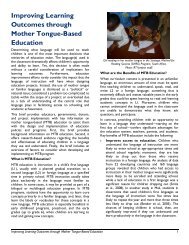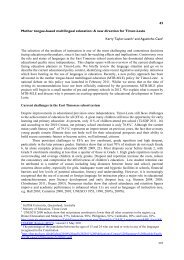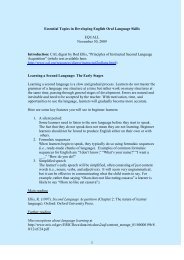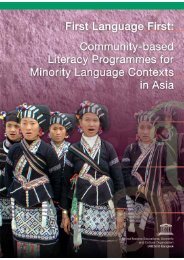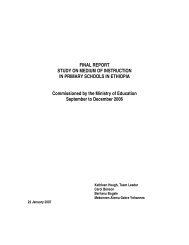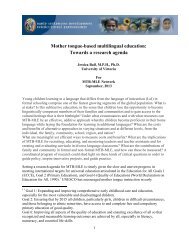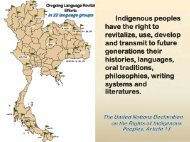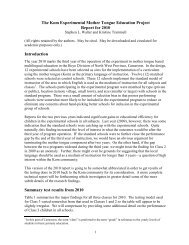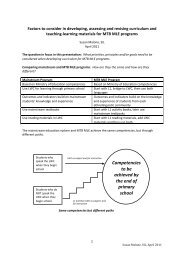Part II.pdf - MTB-MLE Network
Part II.pdf - MTB-MLE Network
Part II.pdf - MTB-MLE Network
You also want an ePaper? Increase the reach of your titles
YUMPU automatically turns print PDFs into web optimized ePapers that Google loves.
population distribution, economic development level, relationship and cultural learning<br />
styles. To make bilingual teaching for ethnic groups effective, it is necessary to identify<br />
the characteristics of individual languages, and also to take non-linguistic factors into<br />
consideration.<br />
• Bilingual education programmes should be responsive to the environment in which the<br />
programme is being conducted. For historical and societal reasons, ethnic groups in<br />
China have experienced different levels of development. Thus, bilingual education<br />
approaches should be designed in relation to the language, society and culture of different<br />
nationalities in different regions. This means that the same mode of delivery cannot be<br />
adopted for different nationalities and for different regions. Programmes should also<br />
integrate the immediate interests, long-term interests and mutual interests of different<br />
nationalities together.<br />
4. Challenges in Developing Bilingual Literacy for Ethnic<br />
Groups<br />
Lack of qualified bilingual teachers<br />
Teachers play significant roles in the effective implementation of bilingual education. However,<br />
there needs to be improvement regarding bilingual teachers in ethnic regions in China, not only in<br />
the quantity of teachers, but also in quality. Currently, those who have interest in and have been<br />
involved in research on bilingual education are mainly some linguists, education experts and university<br />
teachers. These people do not have specific experience in primary and middle school teaching, or<br />
knowledge of bilingual education approaches. Primary school teachers with experience in bilingual<br />
education are busy with their classroom teaching, do not have much research experience and are<br />
limited in their knowledge of bilingual education theories. Among these bilingual teachers, those<br />
who master ethnic languages do not tend to have a high level of Chinese, and those who master<br />
Chinese cannot understand ethnic languages. Generally speaking, there are few bilingual teachers<br />
who master both Chinese and ethnic languages, possess specific bilingual teaching experience and<br />
have knowledge of linguistics. There is, thus, an urgent need to train bilingual teachers and improve<br />
the skills of language teachers from ethnic group regions.<br />
Lack of theoretical research on bilingual education in China<br />
There have been several decades of bilingual teaching for ethnic groups in China, and great progress<br />
has been made. However, there is little systematic theoretical research on bilingual teaching, and<br />
few case studies available. Research on bilingual education needs to be prioritized in order to inform<br />
bilingual teaching practice and, ultimately, contribute towards the comprehensive development of<br />
ethnic groups, local economy and society.<br />
Lack of funds for bilingual education<br />
This is a national problem, especially in regions with cultural minorities. The conditions for<br />
educational development in regions where ethnic groups live are very hard. These places have<br />
155





